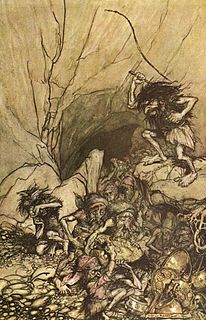 W
WIn German heroic legend, Alberich is a dwarf. He features most prominently in the poems Nibelungenlied and Ortnit. He also features in the Old Norse collection of German legends called the Thidreksaga under the name Alfrikr. His name means "ruler of supernatural beings (elves)", and is equivalent to Old French Auberon.
 W
WAlpharts Tod is an anonymous late medieval Middle High German poem in the poetic cycle of the hero Dietrich von Bern, the legendary counterpart of the historical Ostrogothic king Theodoric the Great. It is part of the so-called "historical" Dietrich material. It may have written as early as between 1245 and 1300, but it is only transmitted in a single manuscript from around 1470 or 1480. The place of composition is unknown.
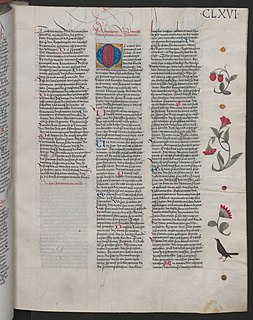 W
WBiterolf und Dietleib is an anonymous Middle High German heroic poem concerning the heroes Biterolf of Toledo and his son Dietleib of Styria. It tells the tale of Biterolf and Dietleib's service at the court of Etzel, king of the Huns, in the course of which the heroes defeat Etzel's enemies, including an extended war/tournament against the Burgundian heroes of the Nibelungenlied. As a reward for their services, Dietleib and Biterolf receive the March of Styria as a fief. The text is characterized by its comedic parody of the traditions of heroic epic.
 W
WDietrichs Flucht or Das Buch von Bern is an anonymous 13th-century Middle High German poem about the legendary hero Dietrich von Bern, the legendary counterpart of the historical Ostrogothic king Theodoric the Great. It is part of the so-called "historical" Dietrich material and is closely related to, and always transmitted together with, a second Dietrich poem, the Rabenschlacht. A Heinrich der Vogler is named as author in an excursus of the poem. Earlier scholarship considered him to be the author of Dietrichs Flucht and possibly also of the Rabenschlacht, however more recent scholarship believes he is only author of this excursus.
 W
WDas Eckenlied or Ecken Ausfahrt is an anonymous 13th-century Middle High German poem about the legendary hero Dietrich von Bern, the legendary counterpart of the historical Ostrogothic king Theodoric the Great. It is one of the so-called fantastical (aventiurehaft) Dietrich poems, so called because it more closely resembles a courtly romance than a heroic epic.
 W
WErmenrichs Tod or Koninc Ermenrîkes Dôt is an anonymous Middle Low German heroic ballad from the middle of the sixteenth century.
 W
WGoldemar is a fragmentary thirteenth-century Middle High German poem by Albrecht von Kemenaten about the legendary hero Dietrich von Bern, the legendary counterpart of the historical Ostrogothic king Theodoric the Great. It is one of the so-called fantastical (aventiurehaft) Dietrich poems, so called because it more closely resembles a courtly romance than a heroic epic.
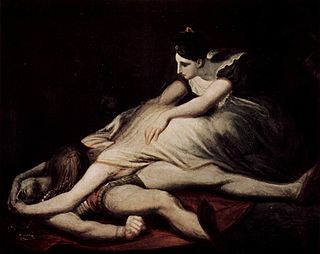 W
WGudrun or Kriemhild is the wife of Sigurd/Siegfried and a major figure in Germanic heroic legend and literature. She is believed to have her origins in Ildico, last wife of Attila the Hun, and two queens of the Merovingian dynasty, Brunhilda of Austrasia and Fredegund.
 W
WGundaharius or Gundahar, better known by his legendary names Gunther or Gunnar, was a historical king of Burgundy in the early 5th century. Gundahar is attested as ruling his people shortly after they crossed the Rhine into Roman Gaul. He was involved in the campaigns of the failed Roman usurper Jovinus before the latter's defeat, after which he was settled on the left bank of the Rhine as a Roman ally. In 436, Gundahar launched an attack from his kingdom on the Roman province of Belgica Prima. He was defeated by the Roman general Flavius Aetius, who destroyed Gundahar's kingdom with the help of Hunnish mercenaries the following year, resulting in Gundahar's death.
 W
WHagen or Högni is a Burgundian warrior in tales about the Burgundian kingdom at Worms. Hagen is often identified as a brother or half-brother of King Gunther. In the Nibelungenlied he is nicknamed "from Tronje".
 W
WHildebrand is a character from Germanic legend. Hildebrand is the modern German form of the name: in Old High German it is Hiltibrant and in Old Norse Hildibrandr. The word hild means "battle" and brand means "sword". The name itself is very likely of Lombardic origin.
 W
WThe Hildebrandslied is a heroic lay written in Old High German alliterative verse. It is the earliest poetic text in German, and it tells of the tragic encounter in battle between a father (Hildebrand) and a son (Hadubrand) who does not recognize him. It is the only surviving example in German of a genre which must have been important in the oral literature of the Germanic tribes.
 W
WKudrun, is an anonymous Middle High German heroic epic. The poem was likely composed in either Austria or Bavaria around 1250. It tells the story of three generations of the ruling house of Hetelings on the North Sea, but is primarily the story of Kudrun, who is abducted by the Norman prince Hartmut who desires to marry her. Kudrun remains true to her fiancé Herwig and eventually is rescued. After the defeat of the Normans, however, Kudrun ensures that peace will be kept between the two peoples by arranging for marriages and alliances.
 W
WLaurin or Der kleine Rosengarten is an anonymous Middle High German poem about the legendary hero Dietrich von Bern, the legendary counterpart of the historical Ostrogothic king Theodoric the Great. It is one of the so-called fantastical (aventiurehaft) Dietrich poems, so called because it more closely resembles a courtly romance than a heroic epic. It likely originates from the region of South Tyrol, possibly as early as 1230, though all manuscripts are later.
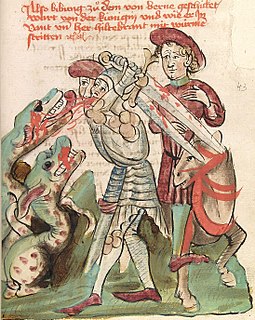 W
WIn legends about Theodoric the Great that spread after his death, the Gothic king Theodoric became known as Dietrich von Bern, a king ruling from Verona (Bern) who was forced into exile with the Huns. The differences between the known life of Theodoric and the picture of Dietrich in the surviving legends are usually attributed to a long-standing oral tradition that continued into the sixteenth century. The majority of legendary material about Dietrich/Theodoric comes from high and late medieval Holy Roman Empire and is composed in Middle High German or Early New High German. Another important source for legends about Dietrich is the Old Norse Thidrekssaga, which was written using German sources. In addition to the legends detailing events that may reflect the historical Theodoric's life in some fashion, many of the legends tell of Dietrich's battles against dwarfs, dragons, giants, and other mythical beings, as well as other heroes such as Siegfried. Dietrich also appears as a supporting character in other heroic poems such as the Nibelungenlied, and is frequently referenced and alluded to throughout medieval German literature.
 W
WDas Lied vom Hürnen Seyfrid, or Hürnen Seyfrid for short, is an anonymous Early New High German heroic ballad. The poem concerns the adventures of young Siegfried, hero of the Nibelungenlied. It preserves traditions about Siegfried that are otherwise only known from Old Norse sources and thus attest their existence in oral traditions about Siegfried that circulated outside of the Nibelungenlied in Germany.
 W
WDas Nibelungenlied is a novel by German writer Albrecht Behmel about the medieval epic of the same name. The story follows the Middle High German original.
 W
WOrtnit is the eponymous protagonist of the Middle High German heroic epic Ortnit. First written down in strophic form in around 1230 by an anonymous author, it circulated in a number of distinct versions.
 W
WDie Rabenschlacht is an anonymous 13th-century Middle High German poem about the hero Dietrich von Bern, the legendary counterpart of the historical Ostrogothic king Theodoric the Great. It is part of the so-called "historical" Dietrich material and is closely related to, and always transmitted together with, a second Dietrich poem, Dietrichs Flucht. At one time, both poems were thought to have the same author, possibly a certain Heinrich der Vogler, but stylistic differences have led more recent scholarship to abandon this idea.
 W
WDer Rosengarten zu Worms, sometimes called Der große Rosengarten to differentiate it from Der kleine Rosengarten (Laurin), and often simply called the Rosengarten, is an anonymous thirteenth-century Middle High German heroic poem in the cycle of Dietrich von Bern. The Rosengarten may have been written as early as before 1250, but is securely attested by around 1300. It is unclear where it was written.
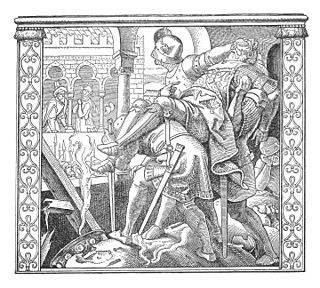 W
WRüdiger von Bechelaren is a legendary hero of German mythology immortalised in the Nibelungenlied saga. Serving as the Austrian Margrave of Pöchlarn and a member of Etzel's court, he becomes conflicted after swearing oaths to uphold two factions that ultimately go to war against each other.
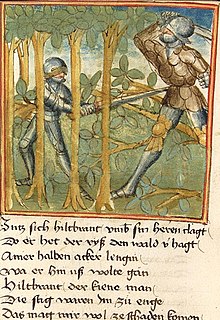 W
WSigenot is an anonymous Middle High German poem about the legendary hero Dietrich von Bern, the legendary counterpart of the historical Ostrogothic king Theodoric the Great. It is one of the so-called fantastical (aventiurehaft) Dietrich poems, so called because it more closely resembles a courtly romance than a heroic epic. It was likely written in the Alemannic dialect area, no later than 1300.
 W
WTheodoric the Great, also spelled Theoderic or called Theodoric the Amal, was king of the Ostrogoths (471–526), and ruler of the independent Ostrogothic Kingdom of Italy between 493–526, regent of the Visigoths (511–526), and a patrician of the East Roman Empire. As ruler of the combined Gothic realms, Theodoric controlled an empire stretching from the Atlantic Ocean to the Adriatic Sea.
 W
WVirginal, also known as Dietrichs erste Ausfahrt, or Dietrich und seine Gesellen is an anonymous Middle High German poem about the legendary hero Dietrich von Bern, the legendary counterpart of the historical Ostrogothic king Theodoric the Great. It is one of the so-called fantastical (aventiurehaft) Dietrich poems, so called because it more closely resembles a courtly romance than a heroic epic. The poem was composed by 1300 at the latest, and may have been composed as early as the second quarter of the thirteenth century.
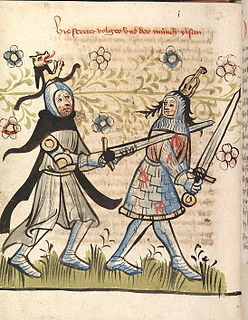 W
WVolker von Alzey is a legendary figure from the Nibelungenlied. He is the minstrel at the court of Burgundy in Worms. Its headquarters Alzey is located about 20 kilometres (12 mi) from Worms. Volker is one of the Burgundian knights and heroes. He dies at Hildebrand's hand with the other Burgundians fighting alongside Hagen at King Etzel's castle.
 W
WWalter of Aquitaine is a legendary king of the Visigoths.
 W
WWolfdietrich is the eponymous protagonist of the Middle High German heroic epic Wolfdietrich. First written down in strophic form in around 1230 by an anonymous author, it survives in four main versions, widely differing in scope and content, and largely independent of each other.
 W
WDer Wunderer, or Etzels Hofhaltung is an anonymous Early New High German poem about the legendary hero Dietrich von Bern, the legendary counterpart of the historical Ostrogothic king Theodoric the Great. It is one of the so-called fantastical (aventiurehaft) Dietrich poems, so called because it more closely resembles a courtly romance than a heroic epic. The poem may have been written before 1300, but is not attested until the turn of the sixteenth century.